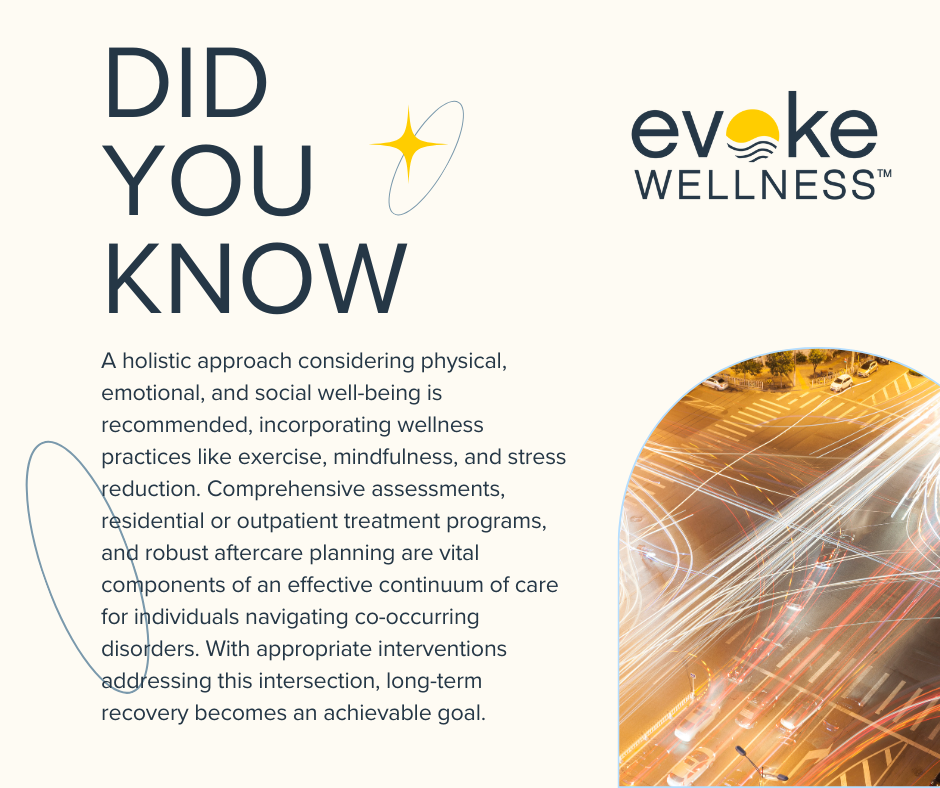As you navigate the complex landscape of mental health and addiction, understanding their intricate relationship is crucial. Recent studies reveal that approximately 50% of individuals with severe mental illness also struggle with substance abuse. This dual diagnosis presents unique challenges, requiring specialized treatment approaches. At Evoke Wellness, we recognize the importance of addressing both mental health and addiction concurrently. Our comprehensive programs, including residential treatment and rehab aftercare, are designed to tackle these intertwined issues effectively. By exploring the latest research and evidence-based practices, you’ll gain valuable insights into how mental health and addiction intersect and the most effective strategies for recovery and long-term wellness.
Together, let’s embrace the journey to recovery and the promise of a new beginning. Call us at (866)429-2960 today or reach out online.
The Intersection of Mental Health and Addiction
Concurrent Conditions
Co-occurring mental health disorders and substance use disorders, often referred to as dual diagnosis or comorbidity, are highly prevalent among individuals seeking addiction treatment. According to one study, estimates suggest more than half of those with a substance use disorder also have a co-occurring mental health issue. These conditions can exacerbate each other, hindering recovery and increasing relapse risk if not addressed comprehensively.
Bidirectional Relationship
There are three potential explanations for the intersection of substance use and mental health disorders: common risk factors like genetics and trauma, mental disorders contributing to substance use as a coping mechanism, and substance use precipitating or worsening existing mental health symptoms. This bidirectional relationship highlights the importance of integrated treatment approaches.
Effective Treatment Strategies
Addressing both substance use and mental health issues concurrently through evidence-based therapies is crucial. Cognitive Behavioral Therapy (CBT), Dialectical Behavior Therapy (DBT), and Motivational Interviewing have shown promise, often combined with medication-assisted treatment for substance use disorders. Other effective modalities include assertive community treatment, therapeutic communities, contingency management, and family-based therapies for adolescents.
Comprehensive Continuum of Care
What is the Link Between Mental Health and Addiction?
A Vicious Cycle
There is an undeniable and often bidirectional link between mental health disorders and substance abuse. According to research, around 20% of adults with mental illness in Massachusetts also struggle with addiction. This co-occurrence, known as a dual diagnosis, creates a complex, self-perpetuating cycle that can be challenging to break free from.
On one side, individuals grappling with mental health conditions like depression, anxiety, or PTSD may turn to drugs or alcohol as a means of self-medicating and temporarily numbing their emotional pain. However, this unhealthy coping mechanism can quickly spiral into substance abuse and addiction, further exacerbating the underlying mental health issues.
Disrupting Brain Chemistry
The link between CNS depressants and depression is particularly concerning. Long-term use of these substances, including benzodiazepines and sleep medications, can disrupt the delicate balance of neurotransmitters like serotonin and dopamine, leading to feelings of sadness, hopelessness, and anhedonia (inability to feel pleasure).
Conversely, individuals struggling with depression or other mental health disorders may be more susceptible to developing substance abuse issues as a form of self-medication or escape. Studies show that those who abuse alcohol and drugs are nearly six times more likely to attempt suicide than those who do not, highlighting the grave consequences of this vicious cycle.
Comprehensive Treatment Approach
Breaking the cycle of mental health disorders and addiction requires a comprehensive, integrated treatment approach that addresses both issues simultaneously. Specialized dual diagnosis programs in Massachusetts utilize evidence-based therapies like cognitive-behavioral therapy (CBT) and dialectical behavior therapy (DBT), along with medication management and holistic interventions.
The treatment process typically begins with medical detoxification, followed by inpatient or residential care, where individuals receive 24/7 support and participate in individual and group therapy sessions, educational workshops, and activities to develop healthy coping strategies. Aftercare services, such as sober living arrangements and ongoing therapy, are crucial for maintaining long-term recovery and preventing relapse.
Conceptualizing the Intersection of Mental Health, Substance Use, and Trauma
Understanding the Intricate Links
Trauma plays a pivotal role in the development of co-occurring mental health and substance use disorders. Traumatic life experiences, especially in early childhood, can alter brain development, increasing the risk of substance abuse later in life. Trauma can weaken the connection between the medial prefrontal cortex and the amygdala, leading to heightened negative emotions and reduced ability to regulate them. Simultaneously, it can strengthen the connection between the medial prefrontal cortex and the ventral striatum, increasing sensitivity to rewards and motivation to use substances.
Embracing Trauma-Informed Care
Addressing this complex intersection necessitates a trauma-informed approach, which emphasizes physical, psychological, and emotional safety. This strengths-based framework creates opportunities for survivors to rebuild a sense of control and empowerment, making it particularly important in substance use disorder (SUD) treatment. Key principles of trauma-informed care include safety, collaboration, empowerment, trustworthiness, and choice. Applying these principles can help prevent retraumatization and improve patient experiences and retention in SUD services.
Overcoming Barriers to Holistic Support
However, implementing trauma-informed care faces significant barriers. Stigma against people with SUDs, operating at structural, interpersonal, and personal levels, can significantly impact their health and well-being. Additionally, structural violence, such as racism, socioeconomic inequity, and gender-based violence, often lies at the root of traumatic experiences and must be addressed. Research has consistently found high rates of trauma among people using mental health services, with trauma being highly correlated with mental health issues and poorer outcomes.
By conceptualizing the intersection of mental health, substance use, and trauma through a trauma-informed lens, we can better understand and address the complex needs of individuals struggling with these interconnected issues. This holistic approach can improve service user experiences, increase staff job satisfaction, and ultimately promote more effective and sustainable recovery.
The Prevalence of Co-Occurring Mental Illness and Substance Abuse
A Widespread Challenge
Co-occurring mental illness and substance abuse disorders are alarmingly common, affecting millions of Americans. According to the Substance Abuse and Mental Health Services Administration (SAMHSA), approximately 21.5 million adults in the U.S. struggle with a co-occurring disorder, where a mental health condition coexists with substance use disorder (SUD). This staggering number highlights the urgent need for integrated treatment approaches.
Exacerbating Cycles
The relationship between mental illness and substance abuse is often cyclical and self-perpetuating. Individuals with mental disorders are more likely to develop SUDs, while substance abuse can also trigger or worsen existing mental health issues. This vicious cycle can create a downward spiral, making recovery even more challenging without comprehensive care.
Common Combinations
Some of the most prevalent co-occurring disorders include anxiety disorders, mood disorders like depression and bipolar disorder, schizophrenia, post-traumatic stress disorder (PTSD), and SUDs involving substances like alcohol, opioids, stimulants, and marijuana. In Massachusetts, opioid addiction and alcohol use disorder are particularly concerning, with fentanyl contributing to a significant rise in overdose deaths.
Integrated Treatment Is Key
Treating only one condition while ignoring the other significantly diminishes the chances of successful recovery and long-term well-being. Specialized dual diagnosis programs in Massachusetts offer a comprehensive approach that combines medically supervised detox, evidence-based therapies like cognitive-behavioral therapy (CBT) and dialectical behavior therapy (DBT), medication-assisted treatment, and integrated mental health services.
This holistic approach aims to help individuals develop coping strategies, improve emotional regulation, and build a strong foundation for lasting sobriety and mental health stability. Aftercare services, such as sober living arrangements and ongoing therapy, are crucial for maintaining long-term recovery after completing a dual diagnosis treatment program.
Addressing the Intersection Through Comprehensive Treatment
Integrated Treatment Approaches
Effectively addressing the intersection of mental health and addiction requires an integrated treatment approach that tackles both conditions simultaneously. Failure to treat co-occurring disorders concurrently can lead to poorer outcomes and higher relapse rates. Integrated care combines evidence-based therapies like cognitive-behavioral therapy (CBT), dialectical behavior therapy (DBT), and motivational interviewing to address the psychological, behavioral, and social aspects of addiction while managing mental health disorders.
Personalized Care Plans
A comprehensive assessment is crucial for identifying co-occurring disorders early and developing personalized treatment plans tailored to each individual’s unique needs. Evoke Wellness at Cohasset specializes in providing dual diagnosis care, offering individualized treatment plans that cater to clients’ specific circumstances. This approach may include medical detoxification, therapeutic modalities, continuous support through aftercare services, and education on co-occurring disorders and relapse prevention strategies.
Holistic Wellness Approaches
Effective treatment for co-occurring disorders extends beyond traditional therapies and incorporates holistic approaches that promote overall well-being. Evoke Wellness emphasizes the importance of considering an individual’s physical, emotional, and social health, incorporating practices like exercise, nutrition, mindfulness, and stress reduction. These complementary techniques can enhance resilience, improve coping mechanisms, and foster a sustainable recovery journey.
Medication-Assisted Treatment (MAT)
Medication-assisted treatment (MAT) can be a valuable component of a comprehensive treatment plan for co-occurring disorders. According to a study, pharmacological interventions targeting substance cravings, withdrawal symptoms, and psychiatric medications for mood and anxiety disorders can support recovery when integrated with psychotherapeutic interventions. However, clinicians must carefully consider the potential benefits and risks, particularly for specific populations like those with stimulant use disorders and ADHD.
By adopting a comprehensive, integrated approach that addresses both mental health and addiction simultaneously, individuals struggling with co-occurring disorders can receive the personalized care, support, and resources necessary for a robust, long-term recovery journey.
Conclusion
As you navigate the complex intersection of mental health and addiction, remember that integrated treatment approaches offer the best path forward. By addressing both issues simultaneously through evidence-based programs, you can achieve lasting recovery and improved overall well-being. Whether through residential treatment, outpatient care, or ongoing aftercare support, professional help is available to guide you on this journey. The road may be challenging, but with proper care and dedication, you can overcome co-occurring disorders and reclaim your life. Take the first step today by reaching out to a qualified treatment center that specializes in dual diagnosis care. Your future self will thank you for making this crucial investment in your health and happiness.
Begin Your Journey with Evoke Wellness
If you or a loved one is considering treatment, Evoke Wellness invites you to contact us. Our compassionate team is ready to answer your questions, discuss your needs, and help you take the first steps toward recovery. At Evoke Wellness, you will find more than just a treatment program – you’ll discover a community dedicated to your wellness and success. Together, let’s embrace the journey to recovery and the promise of a new beginning. Call us at (866)429-2960 today or reach out online.



